Academy Cleaning & Security Pty Ltd v Deputy Commissioner of Taxation [2017]: Taxation Law
VerifiedAdded on 2023/06/11
|7
|1554
|245
AI Summary
This case study discusses the taxation law related to Academy Cleaning & Security Pty Ltd v Deputy Commissioner of Taxation [2017]. It covers the key facts, tax issues, evidence supporting the judge's decision, and evidence supporting Part IVA in ITAA 1936.
Contribute Materials
Your contribution can guide someone’s learning journey. Share your
documents today.
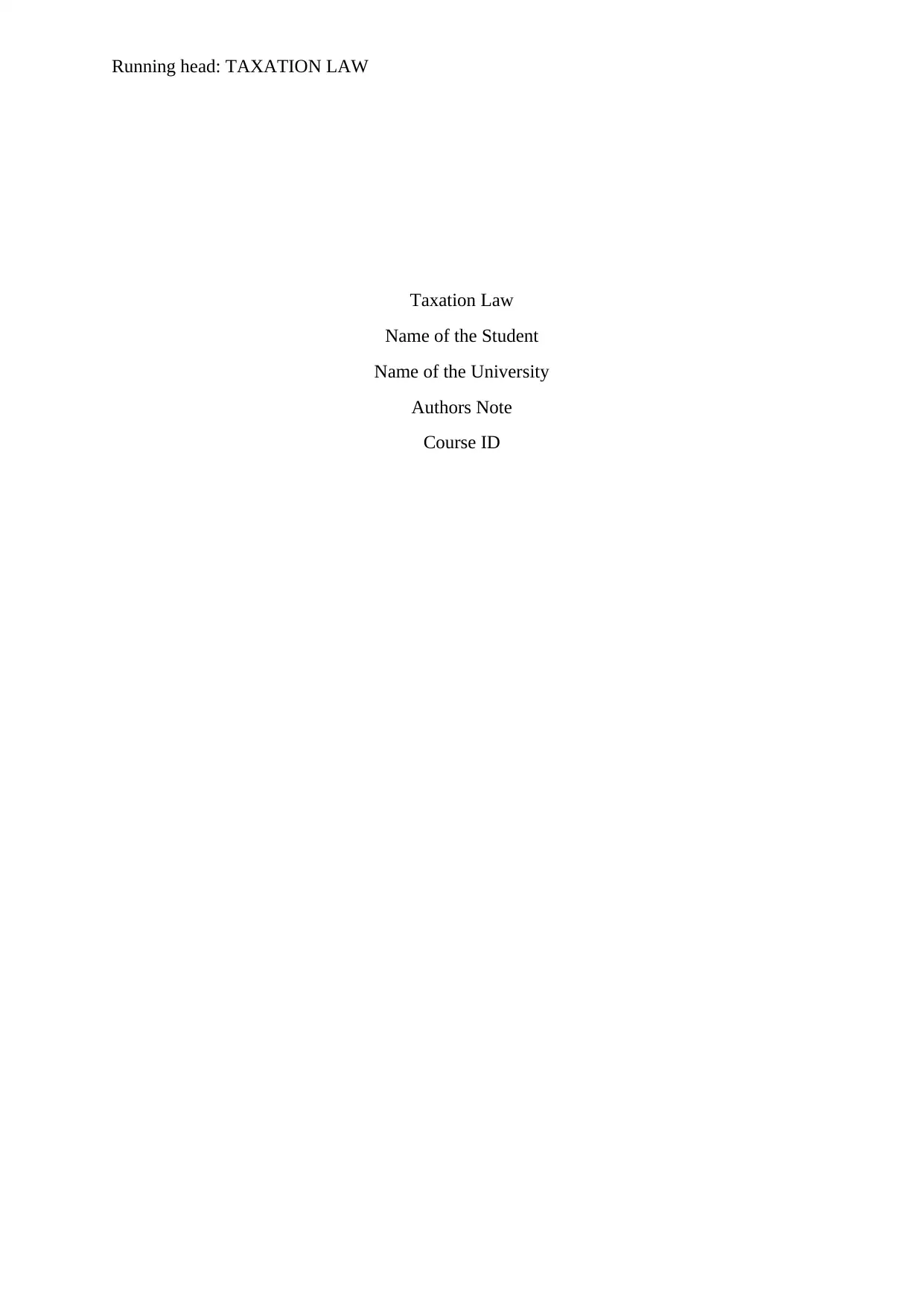
Running head: TAXATION LAW
Taxation Law
Name of the Student
Name of the University
Authors Note
Course ID
Taxation Law
Name of the Student
Name of the University
Authors Note
Course ID
Secure Best Marks with AI Grader
Need help grading? Try our AI Grader for instant feedback on your assignments.
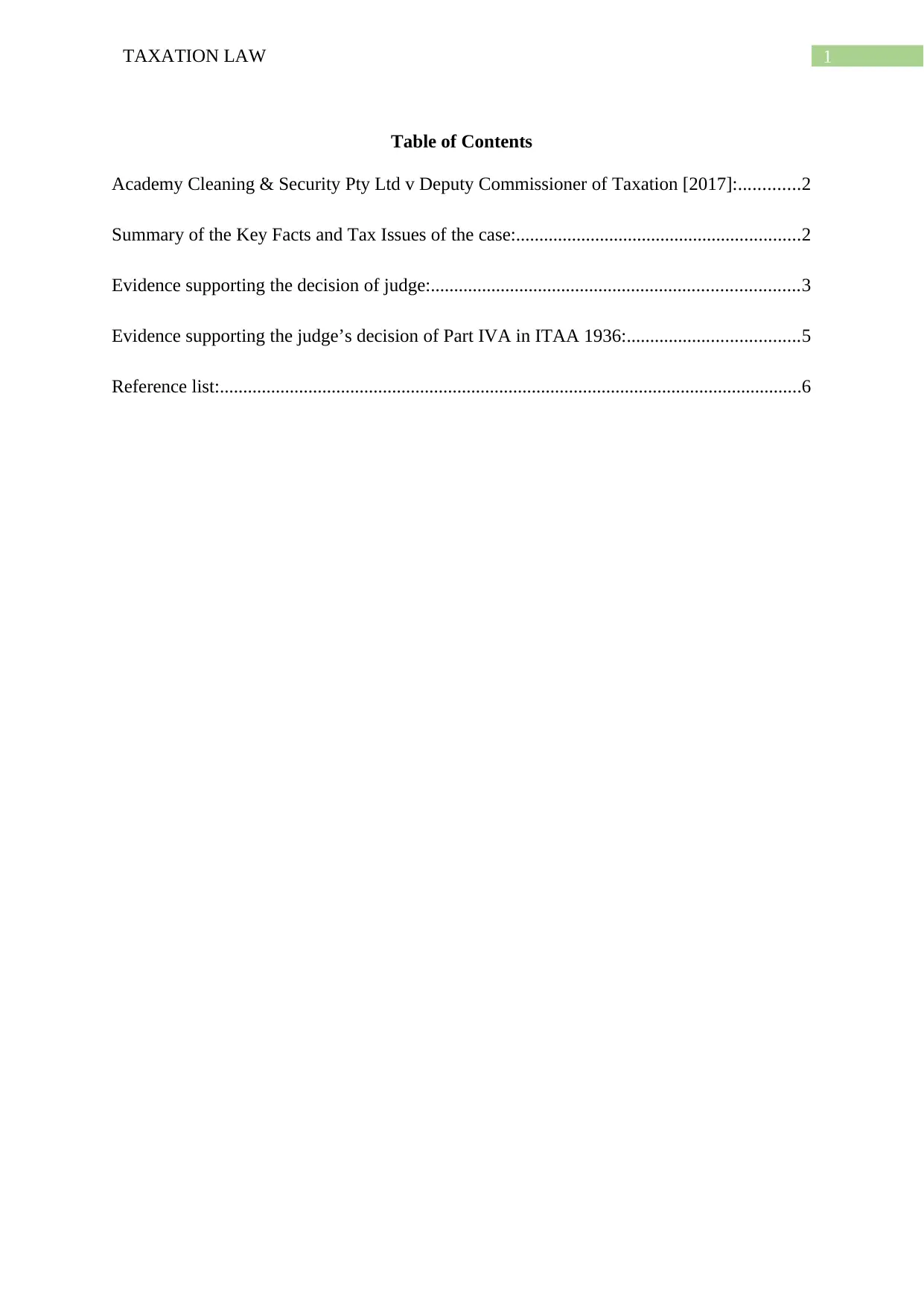
1TAXATION LAW
Table of Contents
Academy Cleaning & Security Pty Ltd v Deputy Commissioner of Taxation [2017]:.............2
Summary of the Key Facts and Tax Issues of the case:.............................................................2
Evidence supporting the decision of judge:...............................................................................3
Evidence supporting the judge’s decision of Part IVA in ITAA 1936:.....................................5
Reference list:.............................................................................................................................6
Table of Contents
Academy Cleaning & Security Pty Ltd v Deputy Commissioner of Taxation [2017]:.............2
Summary of the Key Facts and Tax Issues of the case:.............................................................2
Evidence supporting the decision of judge:...............................................................................3
Evidence supporting the judge’s decision of Part IVA in ITAA 1936:.....................................5
Reference list:.............................................................................................................................6
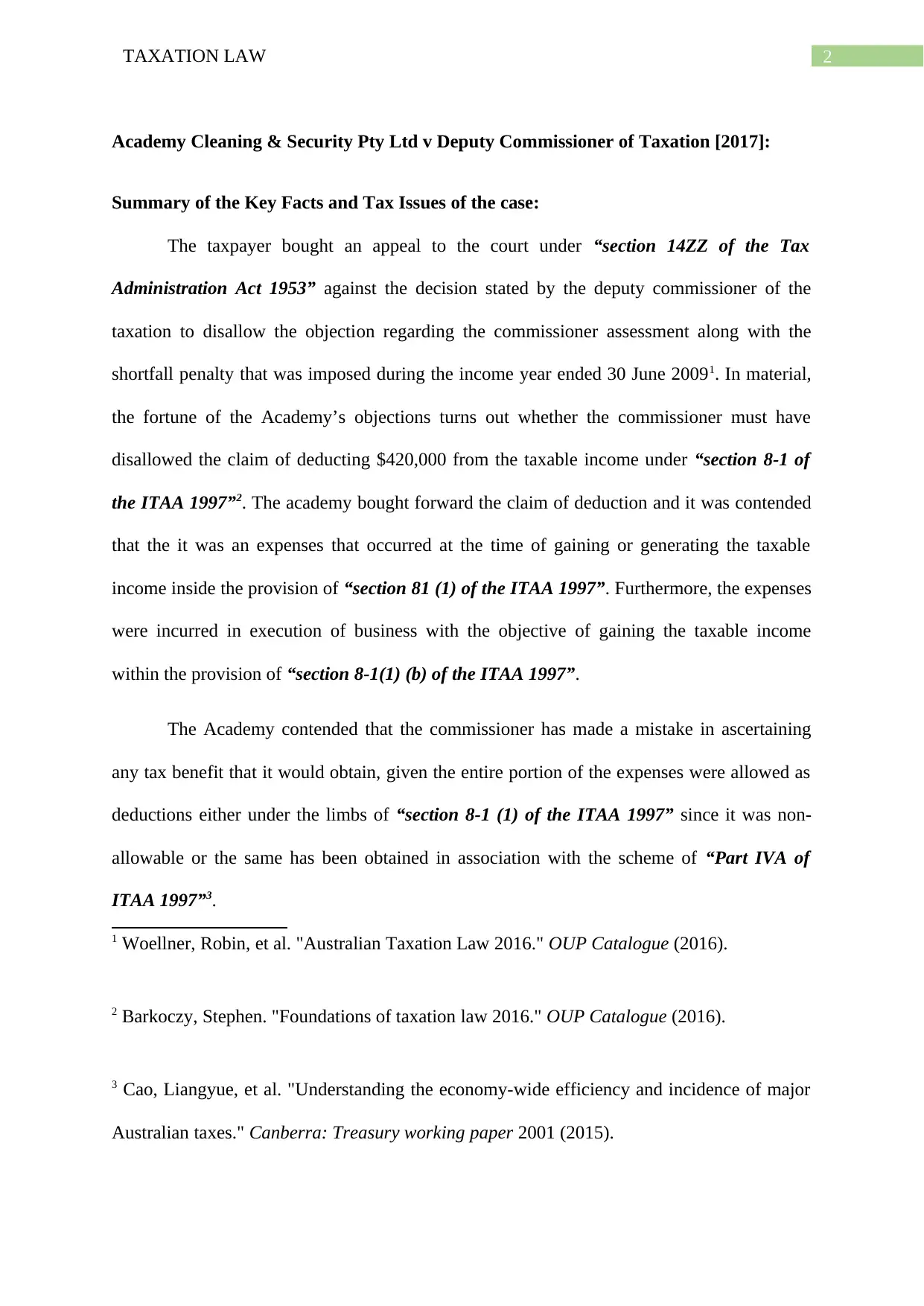
2TAXATION LAW
Academy Cleaning & Security Pty Ltd v Deputy Commissioner of Taxation [2017]:
Summary of the Key Facts and Tax Issues of the case:
The taxpayer bought an appeal to the court under “section 14ZZ of the Tax
Administration Act 1953” against the decision stated by the deputy commissioner of the
taxation to disallow the objection regarding the commissioner assessment along with the
shortfall penalty that was imposed during the income year ended 30 June 20091. In material,
the fortune of the Academy’s objections turns out whether the commissioner must have
disallowed the claim of deducting $420,000 from the taxable income under “section 8-1 of
the ITAA 1997”2. The academy bought forward the claim of deduction and it was contended
that the it was an expenses that occurred at the time of gaining or generating the taxable
income inside the provision of “section 81 (1) of the ITAA 1997”. Furthermore, the expenses
were incurred in execution of business with the objective of gaining the taxable income
within the provision of “section 8-1(1) (b) of the ITAA 1997”.
The Academy contended that the commissioner has made a mistake in ascertaining
any tax benefit that it would obtain, given the entire portion of the expenses were allowed as
deductions either under the limbs of “section 8-1 (1) of the ITAA 1997” since it was non-
allowable or the same has been obtained in association with the scheme of “Part IVA of
ITAA 1997”3.
1 Woellner, Robin, et al. "Australian Taxation Law 2016." OUP Catalogue (2016).
2 Barkoczy, Stephen. "Foundations of taxation law 2016." OUP Catalogue (2016).
3 Cao, Liangyue, et al. "Understanding the economy-wide efficiency and incidence of major
Australian taxes." Canberra: Treasury working paper 2001 (2015).
Academy Cleaning & Security Pty Ltd v Deputy Commissioner of Taxation [2017]:
Summary of the Key Facts and Tax Issues of the case:
The taxpayer bought an appeal to the court under “section 14ZZ of the Tax
Administration Act 1953” against the decision stated by the deputy commissioner of the
taxation to disallow the objection regarding the commissioner assessment along with the
shortfall penalty that was imposed during the income year ended 30 June 20091. In material,
the fortune of the Academy’s objections turns out whether the commissioner must have
disallowed the claim of deducting $420,000 from the taxable income under “section 8-1 of
the ITAA 1997”2. The academy bought forward the claim of deduction and it was contended
that the it was an expenses that occurred at the time of gaining or generating the taxable
income inside the provision of “section 81 (1) of the ITAA 1997”. Furthermore, the expenses
were incurred in execution of business with the objective of gaining the taxable income
within the provision of “section 8-1(1) (b) of the ITAA 1997”.
The Academy contended that the commissioner has made a mistake in ascertaining
any tax benefit that it would obtain, given the entire portion of the expenses were allowed as
deductions either under the limbs of “section 8-1 (1) of the ITAA 1997” since it was non-
allowable or the same has been obtained in association with the scheme of “Part IVA of
ITAA 1997”3.
1 Woellner, Robin, et al. "Australian Taxation Law 2016." OUP Catalogue (2016).
2 Barkoczy, Stephen. "Foundations of taxation law 2016." OUP Catalogue (2016).
3 Cao, Liangyue, et al. "Understanding the economy-wide efficiency and incidence of major
Australian taxes." Canberra: Treasury working paper 2001 (2015).
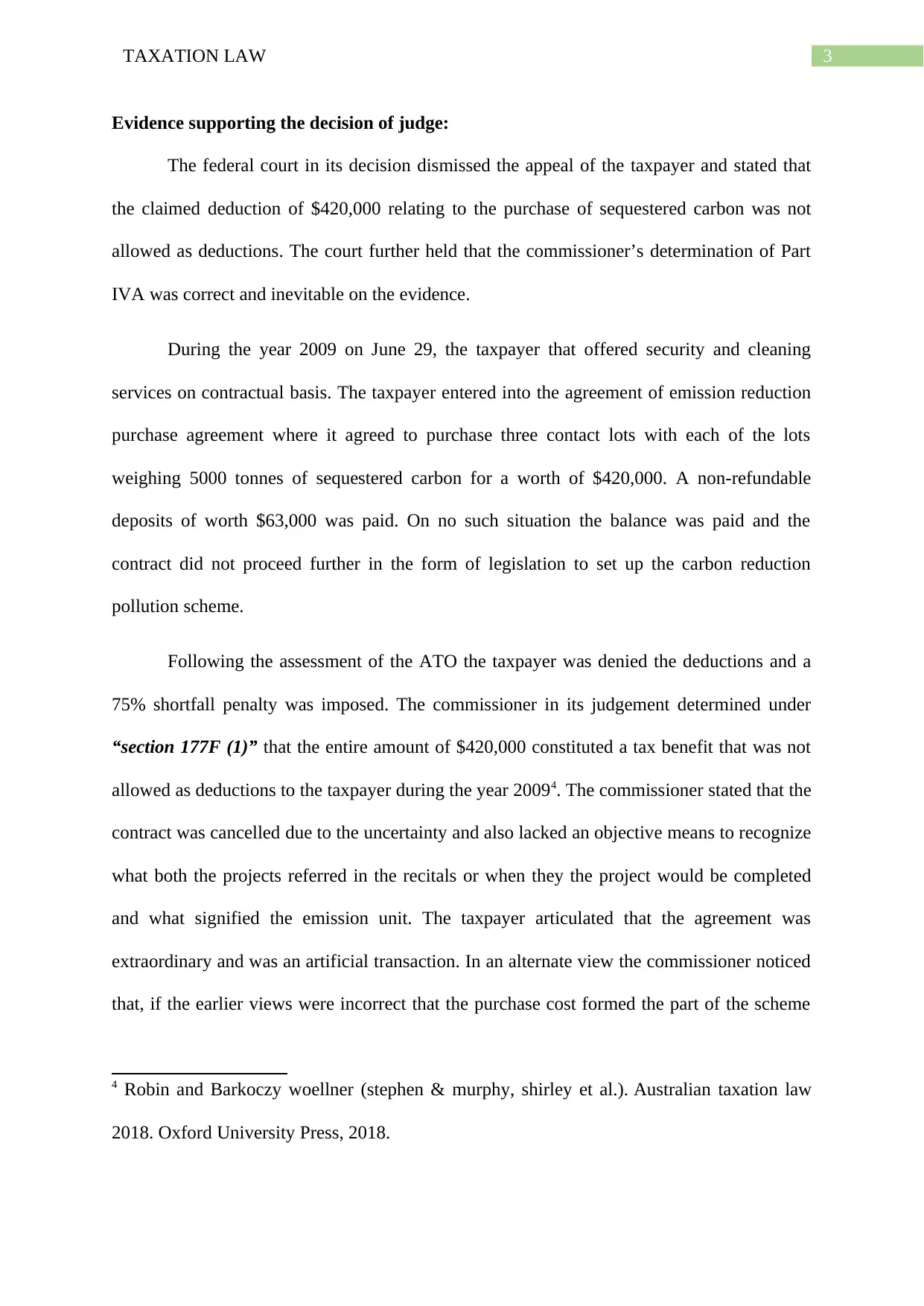
3TAXATION LAW
Evidence supporting the decision of judge:
The federal court in its decision dismissed the appeal of the taxpayer and stated that
the claimed deduction of $420,000 relating to the purchase of sequestered carbon was not
allowed as deductions. The court further held that the commissioner’s determination of Part
IVA was correct and inevitable on the evidence.
During the year 2009 on June 29, the taxpayer that offered security and cleaning
services on contractual basis. The taxpayer entered into the agreement of emission reduction
purchase agreement where it agreed to purchase three contact lots with each of the lots
weighing 5000 tonnes of sequestered carbon for a worth of $420,000. A non-refundable
deposits of worth $63,000 was paid. On no such situation the balance was paid and the
contract did not proceed further in the form of legislation to set up the carbon reduction
pollution scheme.
Following the assessment of the ATO the taxpayer was denied the deductions and a
75% shortfall penalty was imposed. The commissioner in its judgement determined under
“section 177F (1)” that the entire amount of $420,000 constituted a tax benefit that was not
allowed as deductions to the taxpayer during the year 20094. The commissioner stated that the
contract was cancelled due to the uncertainty and also lacked an objective means to recognize
what both the projects referred in the recitals or when they the project would be completed
and what signified the emission unit. The taxpayer articulated that the agreement was
extraordinary and was an artificial transaction. In an alternate view the commissioner noticed
that, if the earlier views were incorrect that the purchase cost formed the part of the scheme
4 Robin and Barkoczy woellner (stephen & murphy, shirley et al.). Australian taxation law
2018. Oxford University Press, 2018.
Evidence supporting the decision of judge:
The federal court in its decision dismissed the appeal of the taxpayer and stated that
the claimed deduction of $420,000 relating to the purchase of sequestered carbon was not
allowed as deductions. The court further held that the commissioner’s determination of Part
IVA was correct and inevitable on the evidence.
During the year 2009 on June 29, the taxpayer that offered security and cleaning
services on contractual basis. The taxpayer entered into the agreement of emission reduction
purchase agreement where it agreed to purchase three contact lots with each of the lots
weighing 5000 tonnes of sequestered carbon for a worth of $420,000. A non-refundable
deposits of worth $63,000 was paid. On no such situation the balance was paid and the
contract did not proceed further in the form of legislation to set up the carbon reduction
pollution scheme.
Following the assessment of the ATO the taxpayer was denied the deductions and a
75% shortfall penalty was imposed. The commissioner in its judgement determined under
“section 177F (1)” that the entire amount of $420,000 constituted a tax benefit that was not
allowed as deductions to the taxpayer during the year 20094. The commissioner stated that the
contract was cancelled due to the uncertainty and also lacked an objective means to recognize
what both the projects referred in the recitals or when they the project would be completed
and what signified the emission unit. The taxpayer articulated that the agreement was
extraordinary and was an artificial transaction. In an alternate view the commissioner noticed
that, if the earlier views were incorrect that the purchase cost formed the part of the scheme
4 Robin and Barkoczy woellner (stephen & murphy, shirley et al.). Australian taxation law
2018. Oxford University Press, 2018.
Secure Best Marks with AI Grader
Need help grading? Try our AI Grader for instant feedback on your assignments.
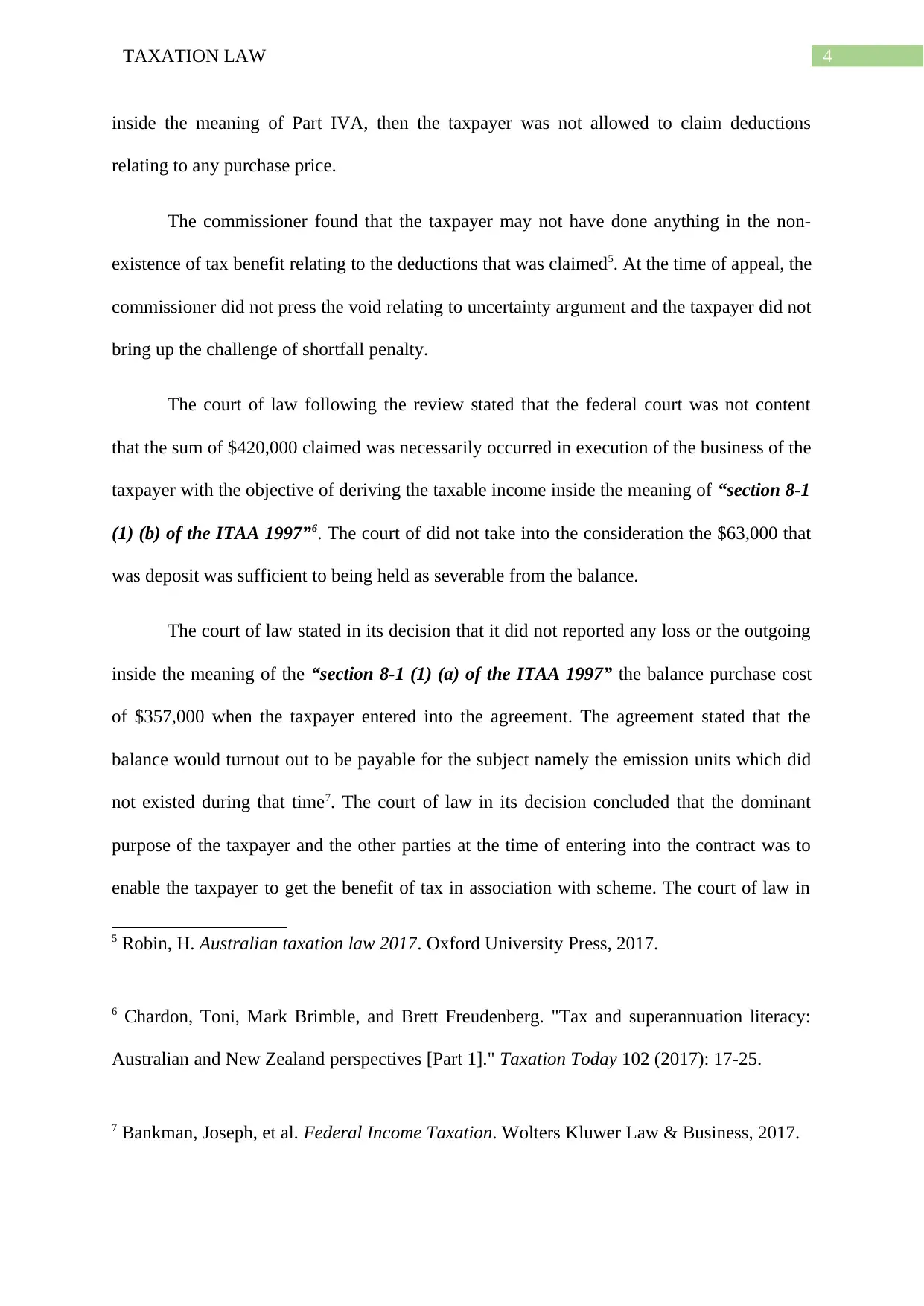
4TAXATION LAW
inside the meaning of Part IVA, then the taxpayer was not allowed to claim deductions
relating to any purchase price.
The commissioner found that the taxpayer may not have done anything in the non-
existence of tax benefit relating to the deductions that was claimed5. At the time of appeal, the
commissioner did not press the void relating to uncertainty argument and the taxpayer did not
bring up the challenge of shortfall penalty.
The court of law following the review stated that the federal court was not content
that the sum of $420,000 claimed was necessarily occurred in execution of the business of the
taxpayer with the objective of deriving the taxable income inside the meaning of “section 8-1
(1) (b) of the ITAA 1997”6. The court of did not take into the consideration the $63,000 that
was deposit was sufficient to being held as severable from the balance.
The court of law stated in its decision that it did not reported any loss or the outgoing
inside the meaning of the “section 8-1 (1) (a) of the ITAA 1997” the balance purchase cost
of $357,000 when the taxpayer entered into the agreement. The agreement stated that the
balance would turnout out to be payable for the subject namely the emission units which did
not existed during that time7. The court of law in its decision concluded that the dominant
purpose of the taxpayer and the other parties at the time of entering into the contract was to
enable the taxpayer to get the benefit of tax in association with scheme. The court of law in
5 Robin, H. Australian taxation law 2017. Oxford University Press, 2017.
6 Chardon, Toni, Mark Brimble, and Brett Freudenberg. "Tax and superannuation literacy:
Australian and New Zealand perspectives [Part 1]." Taxation Today 102 (2017): 17-25.
7 Bankman, Joseph, et al. Federal Income Taxation. Wolters Kluwer Law & Business, 2017.
inside the meaning of Part IVA, then the taxpayer was not allowed to claim deductions
relating to any purchase price.
The commissioner found that the taxpayer may not have done anything in the non-
existence of tax benefit relating to the deductions that was claimed5. At the time of appeal, the
commissioner did not press the void relating to uncertainty argument and the taxpayer did not
bring up the challenge of shortfall penalty.
The court of law following the review stated that the federal court was not content
that the sum of $420,000 claimed was necessarily occurred in execution of the business of the
taxpayer with the objective of deriving the taxable income inside the meaning of “section 8-1
(1) (b) of the ITAA 1997”6. The court of did not take into the consideration the $63,000 that
was deposit was sufficient to being held as severable from the balance.
The court of law stated in its decision that it did not reported any loss or the outgoing
inside the meaning of the “section 8-1 (1) (a) of the ITAA 1997” the balance purchase cost
of $357,000 when the taxpayer entered into the agreement. The agreement stated that the
balance would turnout out to be payable for the subject namely the emission units which did
not existed during that time7. The court of law in its decision concluded that the dominant
purpose of the taxpayer and the other parties at the time of entering into the contract was to
enable the taxpayer to get the benefit of tax in association with scheme. The court of law in
5 Robin, H. Australian taxation law 2017. Oxford University Press, 2017.
6 Chardon, Toni, Mark Brimble, and Brett Freudenberg. "Tax and superannuation literacy:
Australian and New Zealand perspectives [Part 1]." Taxation Today 102 (2017): 17-25.
7 Bankman, Joseph, et al. Federal Income Taxation. Wolters Kluwer Law & Business, 2017.
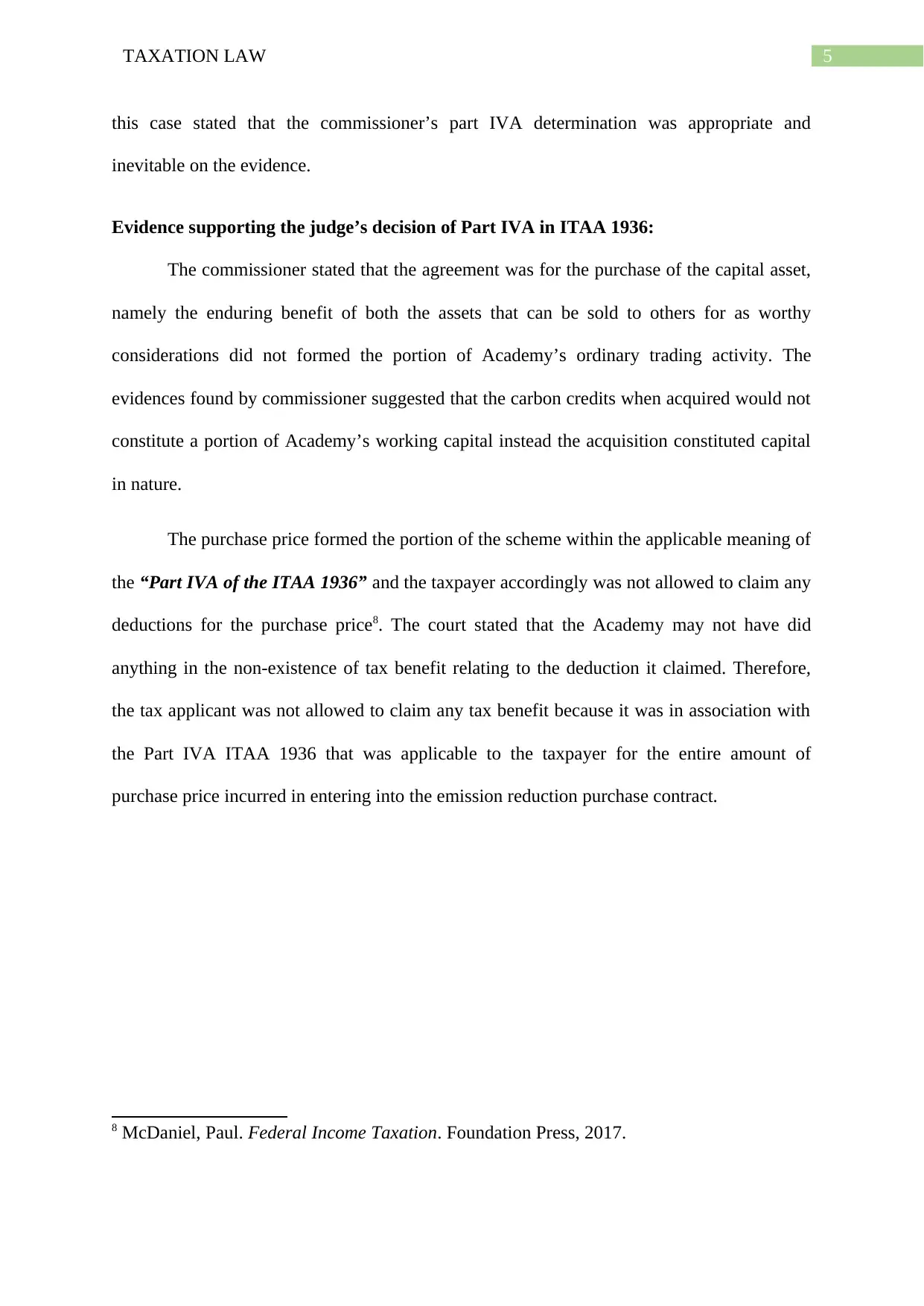
5TAXATION LAW
this case stated that the commissioner’s part IVA determination was appropriate and
inevitable on the evidence.
Evidence supporting the judge’s decision of Part IVA in ITAA 1936:
The commissioner stated that the agreement was for the purchase of the capital asset,
namely the enduring benefit of both the assets that can be sold to others for as worthy
considerations did not formed the portion of Academy’s ordinary trading activity. The
evidences found by commissioner suggested that the carbon credits when acquired would not
constitute a portion of Academy’s working capital instead the acquisition constituted capital
in nature.
The purchase price formed the portion of the scheme within the applicable meaning of
the “Part IVA of the ITAA 1936” and the taxpayer accordingly was not allowed to claim any
deductions for the purchase price8. The court stated that the Academy may not have did
anything in the non-existence of tax benefit relating to the deduction it claimed. Therefore,
the tax applicant was not allowed to claim any tax benefit because it was in association with
the Part IVA ITAA 1936 that was applicable to the taxpayer for the entire amount of
purchase price incurred in entering into the emission reduction purchase contract.
8 McDaniel, Paul. Federal Income Taxation. Foundation Press, 2017.
this case stated that the commissioner’s part IVA determination was appropriate and
inevitable on the evidence.
Evidence supporting the judge’s decision of Part IVA in ITAA 1936:
The commissioner stated that the agreement was for the purchase of the capital asset,
namely the enduring benefit of both the assets that can be sold to others for as worthy
considerations did not formed the portion of Academy’s ordinary trading activity. The
evidences found by commissioner suggested that the carbon credits when acquired would not
constitute a portion of Academy’s working capital instead the acquisition constituted capital
in nature.
The purchase price formed the portion of the scheme within the applicable meaning of
the “Part IVA of the ITAA 1936” and the taxpayer accordingly was not allowed to claim any
deductions for the purchase price8. The court stated that the Academy may not have did
anything in the non-existence of tax benefit relating to the deduction it claimed. Therefore,
the tax applicant was not allowed to claim any tax benefit because it was in association with
the Part IVA ITAA 1936 that was applicable to the taxpayer for the entire amount of
purchase price incurred in entering into the emission reduction purchase contract.
8 McDaniel, Paul. Federal Income Taxation. Foundation Press, 2017.
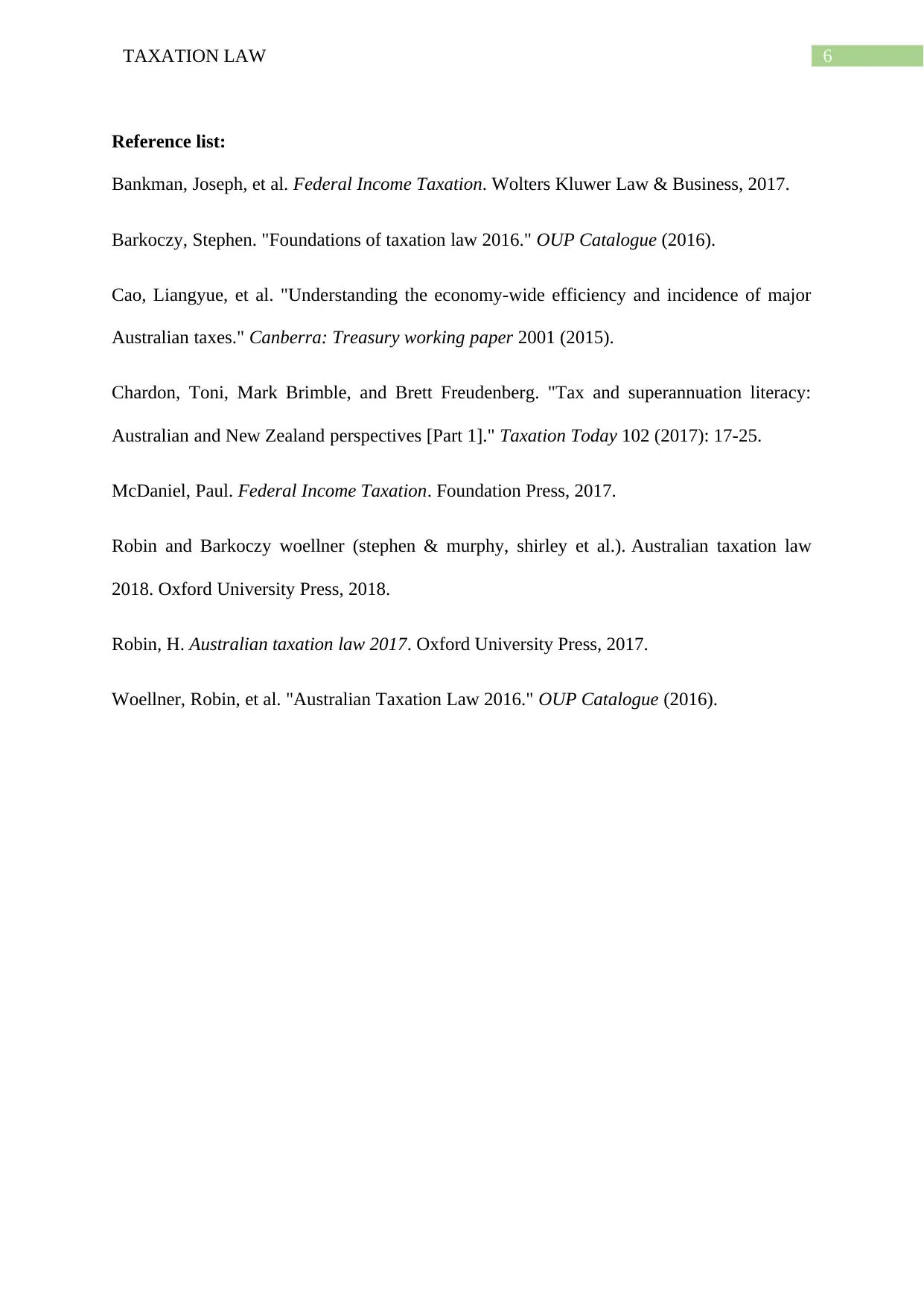
6TAXATION LAW
Reference list:
Bankman, Joseph, et al. Federal Income Taxation. Wolters Kluwer Law & Business, 2017.
Barkoczy, Stephen. "Foundations of taxation law 2016." OUP Catalogue (2016).
Cao, Liangyue, et al. "Understanding the economy-wide efficiency and incidence of major
Australian taxes." Canberra: Treasury working paper 2001 (2015).
Chardon, Toni, Mark Brimble, and Brett Freudenberg. "Tax and superannuation literacy:
Australian and New Zealand perspectives [Part 1]." Taxation Today 102 (2017): 17-25.
McDaniel, Paul. Federal Income Taxation. Foundation Press, 2017.
Robin and Barkoczy woellner (stephen & murphy, shirley et al.). Australian taxation law
2018. Oxford University Press, 2018.
Robin, H. Australian taxation law 2017. Oxford University Press, 2017.
Woellner, Robin, et al. "Australian Taxation Law 2016." OUP Catalogue (2016).
Reference list:
Bankman, Joseph, et al. Federal Income Taxation. Wolters Kluwer Law & Business, 2017.
Barkoczy, Stephen. "Foundations of taxation law 2016." OUP Catalogue (2016).
Cao, Liangyue, et al. "Understanding the economy-wide efficiency and incidence of major
Australian taxes." Canberra: Treasury working paper 2001 (2015).
Chardon, Toni, Mark Brimble, and Brett Freudenberg. "Tax and superannuation literacy:
Australian and New Zealand perspectives [Part 1]." Taxation Today 102 (2017): 17-25.
McDaniel, Paul. Federal Income Taxation. Foundation Press, 2017.
Robin and Barkoczy woellner (stephen & murphy, shirley et al.). Australian taxation law
2018. Oxford University Press, 2018.
Robin, H. Australian taxation law 2017. Oxford University Press, 2017.
Woellner, Robin, et al. "Australian Taxation Law 2016." OUP Catalogue (2016).
1 out of 7
Related Documents
Your All-in-One AI-Powered Toolkit for Academic Success.
+13062052269
info@desklib.com
Available 24*7 on WhatsApp / Email
![[object Object]](/_next/static/media/star-bottom.7253800d.svg)
Unlock your academic potential
© 2024 | Zucol Services PVT LTD | All rights reserved.





